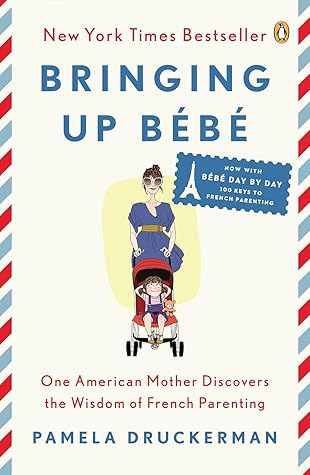More on this book
Community
Kindle Notes & Highlights
Read between
June 23 - June 29, 2023
When I ask French parents how they discipline their children, it takes them a few beats just to understand what I mean. “Ah, you mean how do we educate them?” they ask.
Another reason for pausing is that babies wake up between their sleep cycles, which last about two hours. It’s normal for them to cry a bit when they’re first learning to connect these cycles. If a parent automatically interprets this cry as a demand for food or a sign of distress and rushes in to soothe the baby, the baby will have a hard time learning to connect the cycles on his own. That is, he’ll need an adult to come in and soothe him back to sleep at the end of each cycle.
According to this view, when we rush to feed Bean whenever she whimpers, we’re treating her like an addict. Whereas expecting her to have patience would be a way of respecting her.
French experts view learning to cope with “no” as a crucial step in a child’s evolution. It forces them to understand that there are other people in the world, with needs as powerful as their own. A French child psychiatrist writes that this éducation should begin when a baby is three to six months old.
“Do you know the surest means of making your child miserable?” he writes. “It is to accustom him to getting everything. Since his desires grow constantly due to the ease of satisfying them, sooner or later powerlessness will force you, in spite of yourself, to end up with a refusal. And this unaccustomed refusal will give him more torment than being deprived of what he desires.”
When it’s time to eat, Fanny doesn’t austerely wave her finger at Lucie and order her to taste things. They talk about the food. Often they discuss the flavor of each cheese. And having participated in preparing the meal, Lucie is invested in how it turns out. There’s complicity. If a certain dish is a flop, “we all have a laugh about it,” Fanny says.
For a French kid, candy has its place. It’s a regular-enough part of their lives that they don’t gorge on it like freed prisoners the moment they get their hands on it.
the French parents and caregivers I meet have authority without seeming like dictators. They don’t aspire to raise obedient robots. To the contrary, they listen and talk to their kids all the time. In fact, the adults I meet who have the most authority all speak to children not as a master to a subject but as one equal to another. “You must always explain the reason” for something that’s forbidden, Anne-Marie tells me.
In other words, being strict about a few key things makes parents seem more reasonable and thus makes it more likely that children will obey.
“In France we like it when kids brawl a bit,” the journalist and author Audrey Goutard tells me. “It’s the part of us that’s a bit French and a bit Mediterranean. We like that our children know how to defend their territory and quarrel a bit with other children. . . . We’re not bothered by a certain violence between children.”
By high school, Benoît says there’s little value placed on letting students express their feelings and opinions. “If you say, ‘I love this poem because it makes me think of certain experiences I had,’ that’s completely wrong. . . . What you’re taught in high school is to learn to reason. You’re not supposed to be creative. You’re supposed to be articulate.”
Oof, I can't agree with this one either! (Maybe I'm too American) Sure, being articulate is important, but so is defending your own point of view clearly. I think it's important for students to learn how to analyze and express their opinions.
Please take this book as inspiration, not doctrine. And be flexible. As French parents often tell me, “You have to keep changing what you do.” Kids change quickly. As they do, you can keep the same guiding principles, but apply them differently.
I’ve seen French two-year-olds sit at the kitchen counter tearing up spinach. Three-year-olds learn to peel cucumbers, cut tomatoes with a blunt-tipped knife, and mix the batter for crepes. Parents oversee this process and don’t mind a little mess.
(Françoise Dolto said that by age six, a child should be able to do everything at home that concerns him.)


